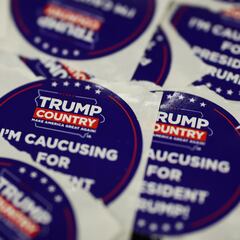Who is allowed to participate in a caucus? Requirements for voting
The 2024 primary season has kicked off with Iowans heading to their local caucus to choose who they want to be on the presidential ballot. How does it work?


The 2024 election season is truly getting under way as Iowans brave the frigid cold to meet up in caucuses around the state. By the end of the night, with any luck, Americans will know who Republican voters in the Hawkeye State want to be at the top of the GOP ticket for president.
In order to find out who the Democrats have chosen, we’ll have to wait until Super Tuesday as the national party gave “First in the Nation” bragging rights to South Carolina. That primary vote will take place Saturday 3 February 2024.
Iowa is one of just a few states that still uses a caucus system to choose who will be on the ballot instead of a primary election. So how does a caucus work and who gets to participate?
Who is allowed to participate in a caucus? Requirements for voting
Caucuses are meetings political parties hold to discuss matters of interest and establish the preferred presidential candidate for the November general elections. Unlike primaries, which state governments organize, caucuses are not state-organized, and only party-affiliated individuals can vote. This means that independent voters in the states that have caucuses are not allowed to participate.
Our latest CBS News polling shows former President Trump with his largest lead among primary voters nationwide this cycle.@SalvantoCBS reports on why the Trump lead continues to grow, what is driving GOP challenger Nikki Haley, and more. pic.twitter.com/JHBOio2ypV
— CBS News (@CBSNews) January 14, 2024
Where caucuses are held voters head to chosen locations across the state. They will be greeted by representatives from each of the campaigns. In some cases, the candidates themselves will make an appearance to make their pitch to caucus attendees. If not, a representative will provide a short speech as to why voters should support their favored candidate. After these speeches have been delivered, attendees will cast their votes, and the winner is announced.
Caucuses give different factions within the party a chance to sway their fellow party affiliates. However, it has the downside that it can alienate independent voters who might be inclined to vote for that party’s candidate but feel left out of the decision-making process and disenfranchised.
In the case of Iowa, Independents or Democrats that want to participate can re-register to do so and same-day regisitration is available in the state. Eligible voters must be at least 18 years old by 5 November 2024.
Here’s a look at the 2024 caucus calendar:
Iowa* (both primary and caucus: see below):
- Both parties' caucus: January 15, 2024
Nevada** (both primary and caucus: see below)
- Both parties' primary: February 6, 2024
- Republican caucus: February 8, 2024
Virgin Islands
- Both parties: February 8, 2024
North Dakota
- Republican: March 4, 2024
American Samoa
- Both parties: March 5, 2024
Iowa*
- Democratic primary: March 5, 2024
Guam
- Both parties: March 16, 2024
North Dakota
- Democratic primary: April 6, 2024
Wyoming
- Democratic caucus: April 13, 2024
- Republican caucus: April 20, 2024
Related stories
Iowa: Iowa Democratic party will hold caucuses but voting will be done exclusively via mail-in ballots between 12 January and Super Tuesday, 5 March 2024, when the results will be announced.
Nevada: The state began holding caucuses in 2008, but under a new state law, Nevada returned to primary elections. However, state GOP is bypassing them in favor of a caucus which will allow them to hold onto more stringent voting rules. So, the GOP will hold both, but candidates can only be on the ballot in one of them resulting in half the candidates participating in the primary and the other half in the caucus.

